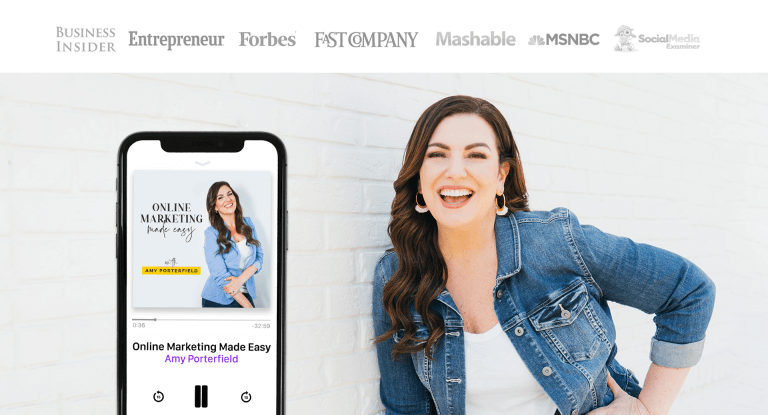
Table of Contents
Before you continue, take a look at LearnWorlds’ Email Templates & Sequences to Launch Your Online Course
In this ebook, you will find ready-to-use email sequences and plug-and-play templates for launching your next online course.
How do you use a free masterclass to generate leads and sell a high-ticket course?
What topic do you choose for the masterclass? What emails do you send beforehand and how do you sell people afterwards?
Those are the questions we set out to answer.
Amy Porterfield is the creator and host of the Online Marketing Made Easy podcast (which has 3,500 reviews and 4.9 out of 5 stars on Apple).
She’s also the creator of best-selling marketing courses, List Builders Society (17,000+ students) and Digital Course Academy (16,000+ students). In her own words, she teaches “business owners, educators and entrepreneurs the profitable action steps for building a highly engaged email list, creating online training courses, and using online marketing strategies to sell with ease.”
For obvious reasons, then, we thought it’d be useful — for us and for you — to take an in-depth look at Amy’s email marketing strategies and tactics: how she uses free courses to sell her paid courses and what emails she sends along the way.
So we browsed her website, signed up for one of her opt-ins, and monitored our emails for a month. Here’s everything we learned!
Who’s this teardown for? If you’re interested in building a personal brand, selling courses, using free masterclasses as lead magnets, or want to know how to craft awesome email funnels for your webinars, then you’ll learn a ton from Amy’s emails. She emails a lot, her brand is very personal, and her sequences are extremely persuasive.
Amy Porterfield’s Lead Generation
First up, how does Amy generate leads?
The answer is multi-faceted.
But current ground zero for Amy’s lead gen strategy — the foundation — would seem to be (ironically for our purposes) her free masterclass that teaches people how to grow their email lists.
The vast majority of Amy’s Facebook advertisements — for which there are nearly 160 active — point toward this lead magnet (see an example below).
The exit-intent popup on her homepage also points to this list-building masterclass.
And so too does the link on her Twitter profile…
That’s smart on her part.
Free courses — or as she calls them, “Masterclasses” — have a way of making people feel like they’re getting something really valuable for free.
Just look at her entire sales page for this free course…
It feels like something you should have to pay for — like something that includes so much value that it couldn’t possibly be free… and yet it is.
That’s what makes a great lead magnet; when people feel like they’re getting something free that shouldn’t be free.
More importantly, the masterclass addresses a primary pain that her target market faces: growing their email list.
Now Amy does have some other lead magnets that are worth mentioning.
On her homepage, for instance, she offers three different resources — the “The All-In-One-Place List Building Library”, the “Ultimate Course Creation Starter Kit”, and the “How to Choose the Perfect (and Most Profitable) Webinar Topic” guide.
(Notice that those three lead magnets appeal to three of the most high-demand desires for her target market: growing an email list, creating courses, and choosing a profitable webinar topic)
The cool thing about those three resources is that they allow visitors to segment themselves and tell Amy what they’re most interested in learning about.
She could then send more pertinent emails to those people based on which lead magnet they chose.
In the end, Amy has quite a few pathways for opting into her email list — each targeting a different pain-point that her target market faces (that, in and of itself, is a lesson).
Heck, even her 404 page is a lead magnet…
But we actually signed up back in March when a different of Amy’s lead magnets took the center stage: her free masterclass on “How to Create and Launch a Profitable Digital Course from Scratch” — a webinar lead-magnet that drove attendees toward joining Digital Course Academy.
So that’s what we signed up for.
Here’s what happened next.
Pre-Masterclass Sequence
Next, we’re going to walk through the emails Amy sent before the live masterclass. These are emails that attempt to build excitement and anticipation for the upcoming event. At the end, we’ll recap these emails so you can see Amy’s overall strategy from a higher level (and use it to create your own).
Note: It’s worth pointing out that we signed up for Amy’s Masterclass using a specific email address, without providing a name. So any time you see the email address UserEmail78@hotmail.com, that’s normally where the recipient’s name would be included.
The First Pre-Masterclass Email
Here’s the first email we received after signing up for Amy’s course-building masterclass with the subject line: It’s official, UserEmail78@hotmail.com 🙌 you’re about to learn how to create a profitable course from scratch (details inside 👉)
She gives a warm welcome, sends all the details that the new subscriber needs for attending the masterclass, and then provides additional incentive for showing up.
Because Amy understands something.
Just because someone signed up to attend her masterclass doesn’t mean they’re going to show up — in fact, a large percentage won’t.
As a counter-balance to that fact, she describes what the person will learn during the masterclass…
… asks them to treat it like a real commitment…
… and even offers an additional free gift if they attend the live masterclass…
This might not look like your typical “Welcome Email” — but that’s because it has a purpose beyond just saying “Hi”. Its goal is to build excitement for the upcoming webinar.
And it does that really well.
In fact, you could follow a very similar format if you offer a masterclass (i.e. webinar) as your primary lead magnet…
Now after we received this email, we got quite a few other emails reminding us about the upcoming webinar and giving us details as to what we’d learn and why we should attend.
But we’ll cover those in the next section.
To finish our discussion of the welcome email, there’s only one other thing we want to point out.
Check out Amy’s footer…
This is where the “Unsubscribe” option sits in every campaign and Amy’s is no exception. But you’ll also notice that before the “Unsubscribe” link, she has a link that allows people to opt out of receiving “emails about creating a digital course.”
Why is that important?
Well, it’s one way to allow people who would otherwise unsubscribe to simply opt-out of email topics that they’re not interested in receiving.
Maybe someone scrolls to the bottom to unsubscribe because this content isn’t relevant to them, but then they see that they can simply opt out of this topic… and they do so, ensuring that they only receive relevant content from Amy and ensuring that they stay on her email list for the time-being.
Win, win.
The Second Pre-Masterclass Email
We received the second email one day after the first with the subject line, Early Access + Team Porterfield
In this email, Amy gives the recipient a sneak-peek of the conversation going on behind the scenes in her VIP Geneva group and invites them to join for free.
Talk about over-delivering for her new subscribers!
The purpose of this private group is likely so that Amy and her team can build closer connections with new subscribers and create a place for the community to grow — after all, community is where trust is built… and all sales rely on trust 😉
The Third Pre-Masterclass Email
Here’s the third email we received on the same day as the second email. It had the subject line, [Masterclass sneak peek] wondering what’s in store 3 days from now? Check this out
In this email, Amy uses her vibrant personality to build excitement for what attendees will learn in the upcoming masterclass. She does so by sharing her “absolute favorite part of the entire masterclass”, which is “the realization that it only takes ONE digital course to change everything.”
She then gives two examples of normal women who used her advice to build profitable online courses.
Finally, Amy reminds the recipient to mark their calendar for the upcoming masterclass if they haven’t already.
The Fourth Pre-Masterclass Email
Two days later, and one day before the Masterclass, we received the following email with the subject line, About tomorrow’s masterclass: what’s your ONE thing, UserEmail78@hotmail.com?
Again, this email encourages the recipient to attend the upcoming masterclass.
Amy uses storytelling — “There are two ways tomorrow can go down…” — to help the subscriber understand the choice in front of them and make a beneficial decision.
The format she uses is simple and effective…
The Fifth Pre-Masterclass Email
On the day of the Masterclass, we received the following email with the subject line Today’s the day you finally make a plan to create your profitable digital course 🙌
One of the things that Amy is really good at in her emails is building an authentic connection with her subscribers.
Try to start all communications with empathy; by showing the reader that you understand what they’re going through.
Doing so builds trust with the reader, shows them that you have their best interest in mind, and proves that you really can help them get from point A to point B.
Amy is excellent at writing empathetically.
In this email (and many of the others), she is transparent about her own feelings, describes the things that her reader is likely experiencing, and she thus builds a ton of trust with her audience.
The format of this email is as follows…
The Sixth Pre-Masterclass Email
On the day of the Masterclass, we received this email one hour before Amy went live. It had the subject line, This is it, UserEmail78@hotmail.com! Wrap up any loose ends and get ready to join me LIVE in 1-hour
In this email, Amy gives the recipient everything they need for the upcoming Masterclass and nudges them, once again, to show up.
In particular, she addresses the (all too common) objection — “I’m too busy today” — by empathizing and then encouraging the recipient to “press pause” on whatever they’re working on.
She explains the benefits of showing up live to the masterclass (rather than just watching the recording later on) and finishes by describing all of the awesome things her audience is about to learn.
The Seventh Pre-Masterclass Email
Finally, we received this email at the moment the Masterclass started. It had the subject line, There’s a spot with your name on it, where are you at, UserEmail78@hotmail.com?!
You might think that sending three emails the day of the masterclass is overkill, but those emails serve an important purpose: they remind people about the upcoming masterclass.
Ever get busy working on something and then totally forget about your upcoming meeting?
Then you see a calendar reminder get sent to your email, curse under your breath, and rush to the meeting?
We all have.
Because it’s easy to forget.
Together, Amy’s day-of emails serve to remind people multiple times about the upcoming masterclass (as well as address final objections and build anticipation).
This final email is no different — and it’s one of the simplest…
Pre-Masterclass Sequence Recap
Whew! That was a lot.
To simplify things, here is the high-level outline, including the times the emails were sent and the basic format for each individual email…
Now let’s take a look at Amy’s post-masterclass email sequence.
As a reminder, her Masterclass aimed to sell — much like a webinar would — her sign-ups for her Digital Course Academy. So many of the post-masterclass emails focus on doing just that.
Here they are!
The First Post-Masterclass Email
We received Amy’s first post-masterclass email immediately after the masterclass ended. It had the subject line, [Limited time masterclass replay] + last chance to fire up your future course results
Now, we did not attend the Masterclass but, from the looks of it, this same email probably went out to everyone who did and everyone who didn’t attend.
Which is why it has a CTA to A) watch the replay and B) sign up for Digital Course Academy.
The format of the email looks something like this…
The Second Post-Masterclass Email
We received this email one day after the masterclass with the subject line, [Open before 12PM ET today] Small list? Failed launch? I’ve got you covered.
This email points toward a Facebook Live video that Amy scheduled called, “Accidental Course Creators.”
The video promotes Digital Course Academy by sharing her client’s success stories — indirectly (and powerfully), this addresses her audience’s remaining objections: “Failure to launch”, lack of confidence, “small list”…
Here’s the format for this email…
The Third Post-Masterclass Email
We received the next email a few hours after the previous one. It was a simple reminder to come watch Amy’s Facebook Live video. It had the subject line, We’re starting! You coming?
This email invites the recipient to attend Amy’s Facebook Live, describes the content (interviews with past clients), and mentions the possibility of receiving a gift card if the recipient attends.
The Fourth Post-Masterclass Email
We received the fourth post-masterclass email immediately after the Facebook Live video. It had the subject line, {Limited time BONUS} Get the Social Media Launch Kit, UserEmail78@hotmail.com
This email promotes a “new bonus” that people who sign up for Digital Course Academy can receive — The Social Media Launch Kit: Done-For-You Templates to Fill Up Your Webinars and Boost Sales by Jasmine Star.
She starts by addressing something that will resonate with her target market — the idea that there’s never enough time to fulfill all of a person’s dreams and ambitions.
Then she explains why creating a course is a great way to accomplish your goals faster.
And finally, she introduces the “exclusive DCA Training” where “Jasmine will walk you through her 4-week promotions strategy on how to use Instagram to launch your course and turn followers into customers.”
She lists what content the bonus includes, provides some testimonials from past DCA clients, and has a final CTA: “Get into action and join DCA TODAY >>> ( + score the Social Media Launch Kit BONUS before it disappears tomorrow!)”
She also creates some honest urgency: “P.S. The Digital Course Academy Doors are closing soon!”
The Fifth Post-Masterclass Email
We received the following email one day after the Facebook Live video with the following subject line, {Bonus expiring TONIGHT!} More course sales and subscribers from…social media?!
In this email, Amy catches the reader’s attention by mentioning a “POP QUIZ (the fun kind, promise!)”
Then she — again — uses empathy to describe how the person likely feels about using social media to sell their course, introduces Jasmine Star (the creator of the bonus she’s about to mention), and promotes the free bonus, with tantalizing detail as to what’s inside.
And finally, she creates urgency by mentioning that this free bonus is going away soon — there’s even a countdown timer at the bottom of the email.
The Sixth Post-Masterclass Email
The sixth post-masterclass email is one final reminder to sign up for DCA before the free add-on bonus expires. We received this the day that the bonus was set to go away. The subject line was Be unstoppable (need to act by 7pm PT)
The format for this email is very simple…
The Seventh Post-Masterclass Email
At this point, Amy has sent a lot of direct sales emails to her audience. So in her seventh post-masterclass email, she tones it down a little bit. We received the following email the day the free bonus expired. It had the following subject line: my boss
Notice how this email is a bit calmer than the other ones?
She’s changing the rhythm a little bit and providing a pep talk for people who don’t have the confidence to create a digital course. And her email CTA is a 3-minute video.
But sure enough, the CTA of that video is her Digital Course Academy (the “Let’s Do This” link leads to her DCA landing page)…
The Eighth Post-Masterclass Email
We received the following email on the same day as the previous two — the day that the free bonus expired. It had the subject line, [DCA] The 12-Pay Option + New Bonus Just Added
In this email, to capture as many conversions as possible, Amy offers a 12-month payment plan for DCA as well as another free bonus: “How to Turn Your Live Launch into a Profit Generating Evergreen Funnel ($497 Value)”
Here’s the basic format…
The Ninth Post-Masterclass Email
We received this email on the same day as the previous three emails — the day that the free bonus expires and now, it’s revealed, the day that DCA itself closes. The email had the subject line, {last call} We’re closing the doors to DCA, are you in, UserEmail78@hotmail.com?
It’s simple and direct.
Amy links to a video she created for people still on the fence, she again explains the benefits of joining DCA, and she prompts the recipient to take action before it’s too late.
You might have noticed that this is the fourth email we received on this day… and that might seem like a lot.
But you have to understand how important the final days leading up to the closing of your course are.
They are really important.
A friend of mine, Jacob McMillen, sells online courses teaching people how to become successful as freelance writers. And he once sent me some screenshots of his course sales that blew his mind.
In August 2020, he sent emails every day from the 12th to the 16th promoting his course. The doors closed on the 16th. Look at when almost everyone purchased…
The same thing happened in October of 2020 — the doors closed on the 18th in this case…
This isn’t unusual among people who sell courses — the majority of people are going to buy on the last day because of a little thing called urgency.
So sending a lot of emails on the final day of your promotion — as Amy does — isn’t necessarily a bad idea.
The Tenth Post-Masterclass Email
This final email has got to be one of our favorites.
Amy has run a successful promotion — she’s emailed many times about Digital Course Academy and she’s probably converted as many people as anyone could convert.
And so this final email — sent two days after the doors have closed and with the subject line, I want you to know I’m cheering you on — is particularly tactful.
With this email, Amy’s only goal is to learn why the subscriber didn’t end up purchasing Digital Course Academy. It points to the following survey page…
That’s it.
And the next time she does the promotion, she can learn from the survey answers and try to create an email campaign that addresses objections she may not have considered before.
Plus, this is just a super tasteful way to end a promotion and maintain a meaningful relationship with your subscribers.
Post-Masterclass Sequence Recap
There you have it!
To simplify things, here is the high-level outline, including the times the emails were sent and the basic format for each individual email…
Amy Porterfield is an excellent marketer.
She knows how to build an authentic connection with her audience. She knows how to get people excited — her passion is contagious! And she knows how to sell.
Course creators have a lot to learn from the sequences she sends.
In fact, you could take inspiration from her emails (and the formats outlined above) and easily adapt your own similar email sequences to get attendance for your webinar and make course sales afterward.
As we imagine Amy would say, “There’s nothing to it but to do it!”
Before you go, this article is part of our Email Marketing for Course Creators workshop.
Before you go, take a look at LearnWorlds’ Email Templates & Sequences to Launch Your Online Course
In this ebook, you will find ready-to-use email sequences and plug-and-play templates for launching your next online course.

Alec Beglarian
Alec helps businesses and startups set up the right foundation and architecture for email that can scale - as well as selling more with email by building relationships with their subscribers & making sure emails get delivered into the inbox. He is the founder of Engage.Guru and EmailMastery.org






